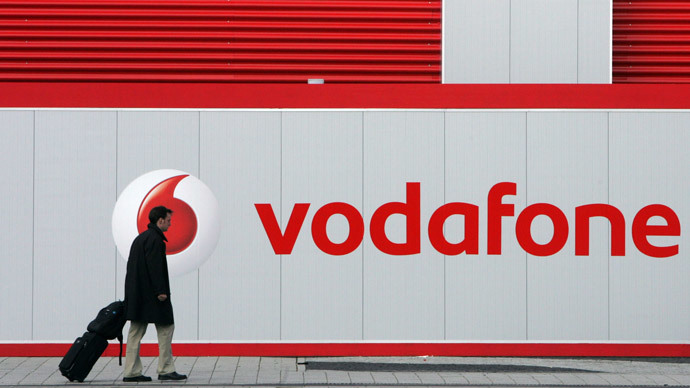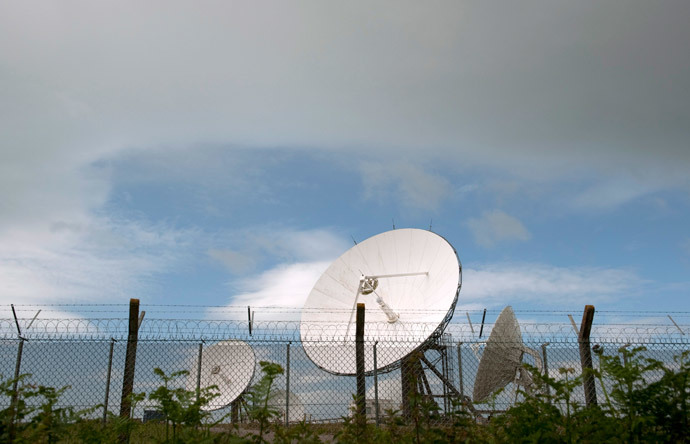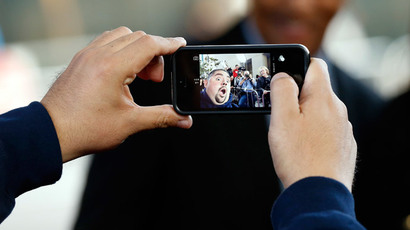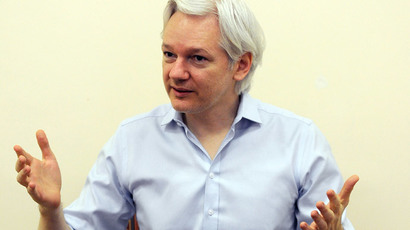Vodafone dances around GCHQ in 40,000-word spying confession

The world’s second-largest mobile phone company has broken its silence over its cooperation with government agencies and their efforts to eavesdrop on unsuspecting customers, but what it fails to mention speaks the loudest.
Assange discusses internet-based Orwellian future
Vodafone’s 88-page ‘Law Enforcement Disclosure Report’ reveals
how 29 governments around the world use an open back door to
eavesdrop on its customers’ private communications.
“[I]n every country in which we operate, we have to abide by
the laws of those countries which require us to disclose
information about our customers to law enforcement agencies or
other government authorities, or to block or restrict access to
certain services,” the Vodafone reports says. “Those
laws are designed to protect national security and public safety
or to prevent or investigate crime and terrorism, and the
agencies and authorities that invoke those laws insist that the
information demanded from communications operators such as
Vodafone is essential to their work.”
However, Vodafone’s corporate candidness stopped short of
describing its alleged collaboration with GCHQ, Britain’s
equivalent of the US National Security Agency.
Snowden’s whistleblowing revealed that GCHQ has tapped into
transatlantic fiber optic cables in a secret program, codenamed
Tempora, which reportedly allows the British spy agency access to
telephone communications and Internet data on millions of people.
GCHQ, documents showed, teamed up with seven telecom companies,
including Vodafone.
The report provided a rather chilling assessment as to the power
of the intelligence agencies when it makes the decision to spy on
a private citizen.

“[A]gencies and authorities have the scope to apply advanced analytics techniques to every aspect of an individual’s communications, movements, interests and associations – to the extent that such activity is lawful – yielding a depth of real-time insights into private lives unimaginable two decades ago.”
Concerning Vodafone’s alleged collaboration with the GCHQ, however, it only admits to a hypothetical possibility that spying on its customers had occurred, or was still occurring.
By issuing a warrant to access private information, "there is the possibility that this power is broad enough to permit government direct access to Vodafone’s network," the document admitted.
Vodafone said that in about six of the countries in which it operates, the law either requires telecommunication firms to install direct access wires for external interception, or allows government agencies to do so. It was not willing to divulge the names of those governments.
"These are the nightmare scenarios that we were imagining," Gus Hosein, executive director of Privacy International, which has taken legal action against the British government over the spying charges, told the Guardian.
"I never thought the telcos [telecom companies] would be so complicit. It's a brave step by Vodafone and hopefully the other telcos will become more brave with disclosure, but what we need is for them to be braver about fighting back against the illegal requests and the laws themselves."

Vodafone’s coming clean inspires Deutsche Telekom
Incidentally, on the same day Vodafone went public with news of
its affiliation with government spying efforts, Deutsche Telekom,
which has 140 million customers worldwide, has also said it would
come clean.
"Deutsche Telekom has initially focused on Germany when it
comes to disclosure of government requests. We are currently
checking if and to what extent our national companies can
disclose information. We intend to publish something similar to
Vodafone."
Indeed, Vodafone seems desperate to wants to wash its hands of
its past collaboration with intelligence services, laying out its
predicament in the transparency report.
"These pipes exist, the direct access model exists,”
Vodafone's group privacy officer, Stephen Deadman, told the
Guardian. "We are making a call to end direct access as a
means of government agencies obtaining people's communication
data. Without an official warrant, there is no external
visibility.”
On the question of whether GCHQ taps directly into Vodafone’s
system, Deadman said such a system would be illegal because
British law prohibits intelligence agencies from obtaining
information without a warrant. Nevertheless, in what amounts to a
potentially massive security loophole, British law permits the
indiscriminate collection of information on an unidentified
number of targets.
"We need to debate how we are balancing the needs of law
enforcement with the fundamental rights and freedoms of the
citizens. The ideal is we get a much more informed debate going,
and we do all of that without putting our colleagues in
danger."
Unfortunately for privacy and civil rights groups, the move
toward bringing an end to governments accessing the systems of
telecommunication companies would have had a running start had
Vodafone and GCHQ admitted to their dangerous liaisons.














